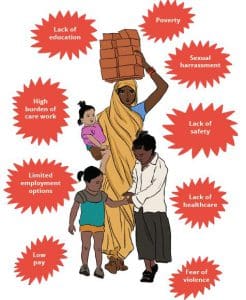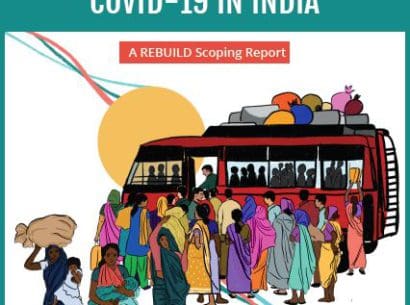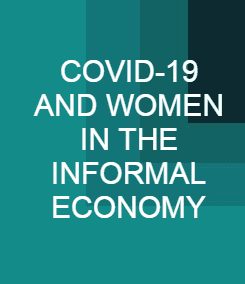
Women in Urban Informal Work and COVID-19 in India
Care economy, Economic Opportunity & Security, Family Planning, Financial Inclusion, Gender Mainstreaming, Gender-based Violence, Health, Intimate Partner Violence, Men and Masculinities, Mental Health, Migration, Reproductive Empowerment, Sexual and Reproductive Health and Rights, Sexual Violence, Violence Against Women and Girls, Women in the Value Chain
A REBUILD Scoping Report
2022
 The COVID-19 pandemic has wrought a global socio-economic crisis, with profound implications for the wellbeing of individuals, households and communities. It has further deepened existing social inequalities, heightened the risks for gender based violence (GBV), and limited the access to health services, including sexual and reproductive health among marginalized groups. As countries move to mitigate the health threats of the COVID-19 pandemic, immediate policy action has often led to large economic and social costs that are majorly borne by vulnerable and low-income populations, among whom women are the most affected. So far, immediate, state-led policy responses focused on COVID-19 clinical management, quarantine guidelines, mobility restrictions and lockdowns, protective and promotive social safety, and economic stimulus packages.
The COVID-19 pandemic has wrought a global socio-economic crisis, with profound implications for the wellbeing of individuals, households and communities. It has further deepened existing social inequalities, heightened the risks for gender based violence (GBV), and limited the access to health services, including sexual and reproductive health among marginalized groups. As countries move to mitigate the health threats of the COVID-19 pandemic, immediate policy action has often led to large economic and social costs that are majorly borne by vulnerable and low-income populations, among whom women are the most affected. So far, immediate, state-led policy responses focused on COVID-19 clinical management, quarantine guidelines, mobility restrictions and lockdowns, protective and promotive social safety, and economic stimulus packages.
The present review aims to discuss how COVID-19-related health and economic shocks, and the policy responses to them, interacted with pre-existing vulnerabilities to impact livelihoods, the experience of GBV and healthcare outcomes for women who work in the urban informal economy in India. This review examines the COVID-19 policy response period from March 2020 to February 2021 to understand the implications of the national lockdown and immediate policy responses as well as the slow recovery through the unlock phases.
KEY FINDINGS
- Reproductive health suffered, and abortion was compromised because of lack of access to services, restrictions on mobility, and rerouting of health workers for COVID -19 management. Unplanned pregnancies also increased since social distancing did not lead to any break in physical intimacy and family planning methods like contraceptives or condoms were not easily available.
- Sexual harassment at workplace also increased but most women did not report it for fear of losing jobs in a situation of COVID-19 where the job market was anyhow extremely fragile.
- Slums/Informal settlement witnessed increased stigma of their residents by other, better off city dwellers, often their employers.
- Surveys showed that across various occupations where women are employed, 9 out of 10 women informal workers reported experiencing increased mental stress and tension due to uncertainties of work and income.
- The pandemic crises invariably led to food insecurity and a sudden depletion of household savings. Studies suggest that households were coping with COVID-19 by eating fewer times and consuming smaller quantities as well as lower nutritional quality food as well as becoming increasingly dependent on the Public Distribution System
The learnings documented in this publication were collated as part of a three-country research study undertaken by ICRW Asia, REBUILD: COVID-19 & Women in the Informal Economy in Kenya, Uganda & India, with the support of the Bill & Melinda Gates Foundation and the International Development Research Centre. The facts and information in this report may be reproduced/quoted/cited only for non-commercial use and with appropriate attribution.



